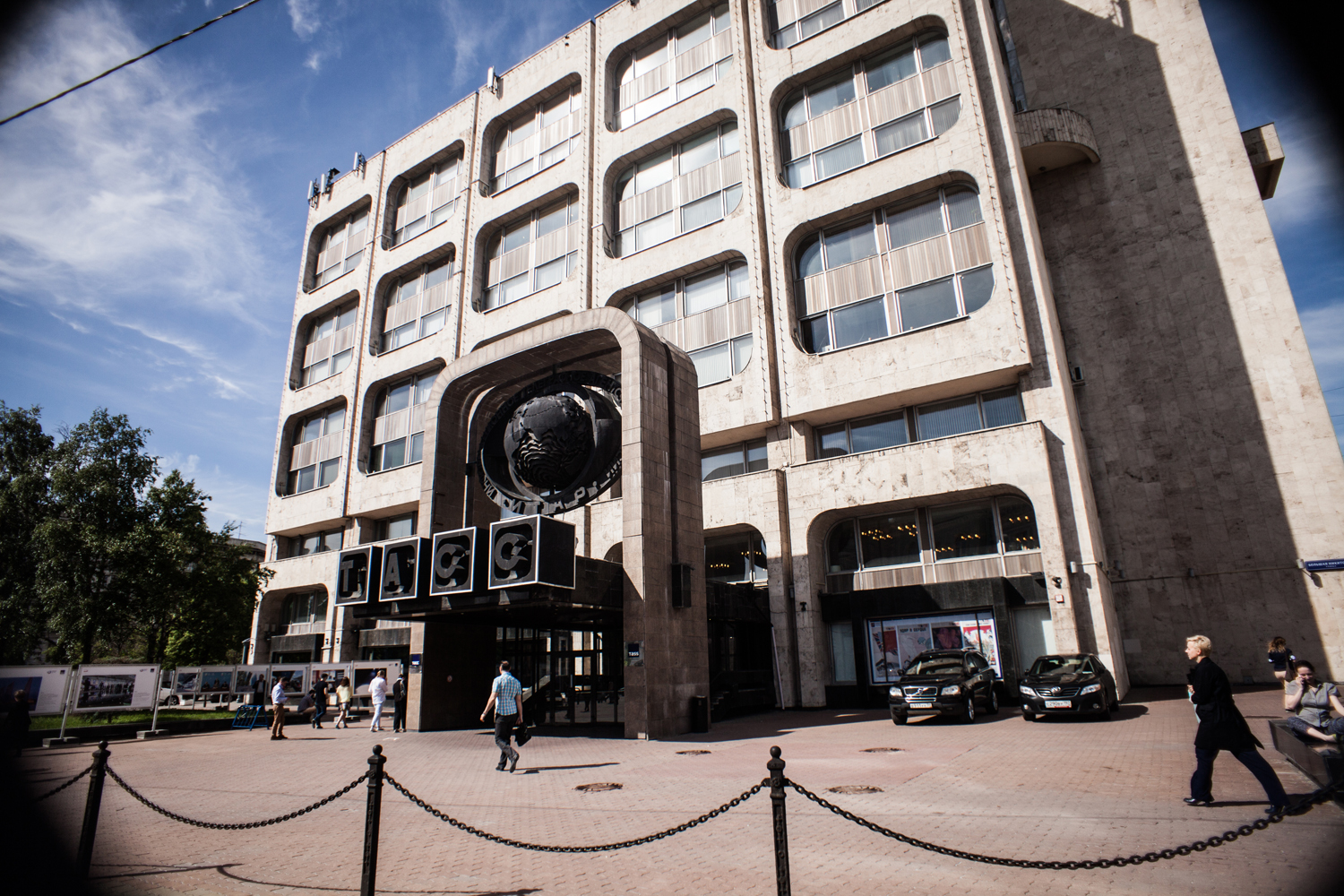
In today’s world, information warfare is a core element of hybrid warfare — a strategy that blends traditional military operations with non-military tactics such as information operations, cyberattacks, economic pressure, political destabilisation, and psychological warfare. Since at least 2014, Russia has employed every possible tool of aggression against Ukraine, including efforts to manipulate public opinion. That’s why effectively countering information warfare is also a key component of Ukraine’s path to victory.
It’s hard to estimate the accurate sum spent on informational warfare against Ukraine because Russian budget information is classified. According to the International Centre for Policy Studies, Russia’s annual spending on information warfare in the West against Ukraine reaches $4 billion. At the same time, according to Ukrainian intelligence, Russia planned to spend $1.5 billion to destabilise Ukraine in the spring of 2024 alone.
Russia operates powerful propaganda channels targeting international audiences and allocates substantial budget funds to media financing. For instance, it spends over $300 million annually to fund the multilingual state-run broadcaster Russia Today (RT), with the outlet’s 2023 expenditures reaching an all-time high. In addition to direct funding of propaganda media and disinformation campaigns, Russia employs other tools of information warfare — including cyberattacks, hacking, and trolling. The full cost of these efforts is difficult to estimate, yet experts unanimously agree that over the past decade, Russia has consistently expanded and refined its propaganda capabilities. Today’s Russian propaganda methods are finely tuned to confuse, distract, and incite panic to achieve its key objective: to undermine international support for Ukraine.
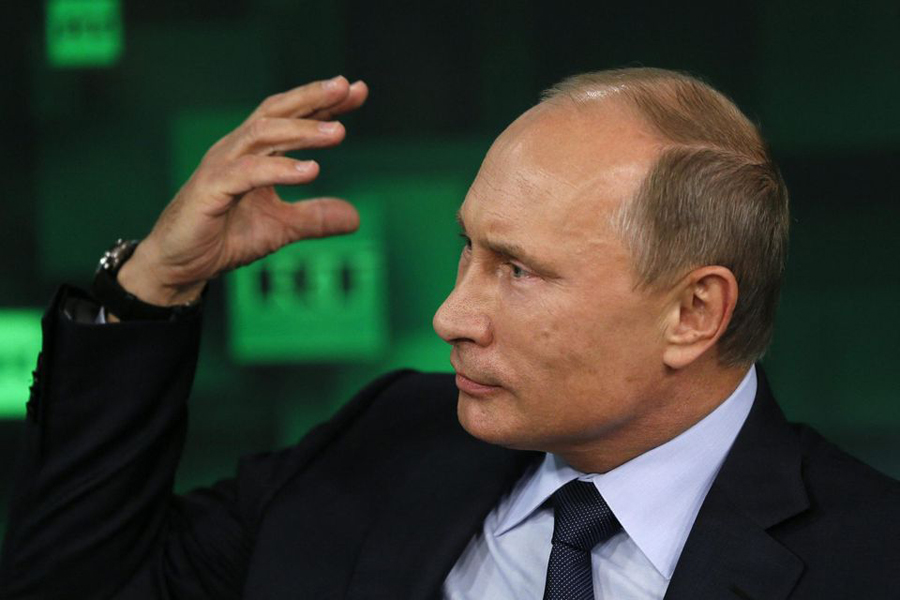
Photo: AFP via Getty Images.
Countering information aggression in a hybrid war is a complex task that requires the joint efforts of the government, military, media, civil society, and every citizen.
In this piece, Ukraїner takes a closer look at several organisations resisting the enemy in the information space. Founded in 2014, StopFake carries out fact-checking and exposes Russian propaganda. Detector Media, a Ukrainian media focuces on media environment, is committed to countering Russian disinformation alongside its core work. Following the full-scale invasion, the community of communication specialists PR Army united to help explain the terrorist nature of the Russian regime to the world. Molfar has established an OSINT community that conducts military investigations and debunks propaganda. Meanwhile, experts at LetsData identify propaganda narratives spreading online and pass this intelligence to organisations working to dismantle them.
How the Ukrainian organisation StopFake works
Since 2014, the organisation has been exposing and debunking false information about Ukraine. Over time, the project evolved into an information hub that analyses Kremlin propaganda in all its forms, studying the methods it uses to influence Ukraine, as well as other EU countries and former Soviet states. StopFake publishes its materials in 11 languages, including Polish, Czech, English, Italian, and German, in addition to Ukrainian.
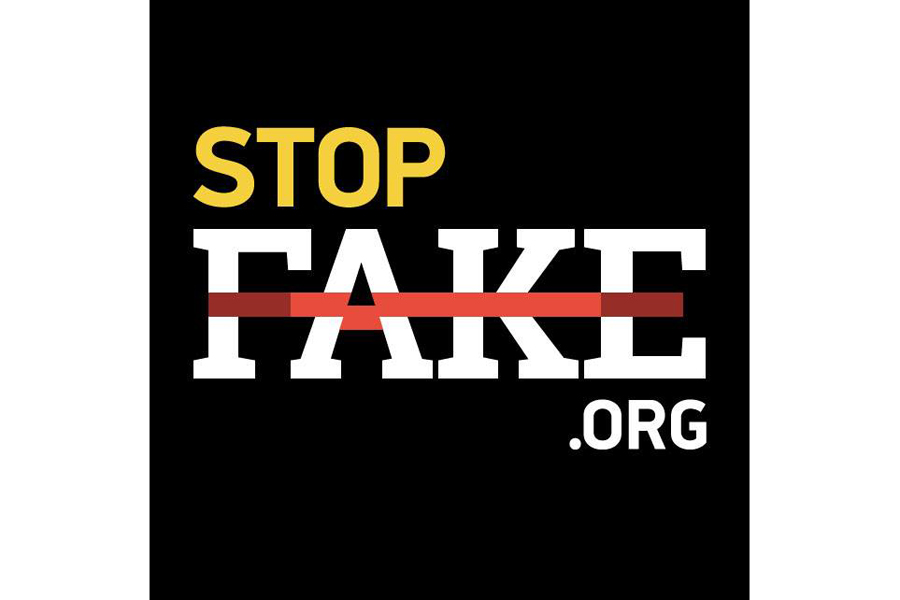
Image: StopFake Facebook page.
One of the organisation’s co-founders, Ruslan Deynychenko, has been analysing the information war for the past ten years.
— In 2013-2014, we saw how Russia was preparing for the informational war. At the beginning of the full-scale invasion, Russian propaganda changed only the amount and its tone.
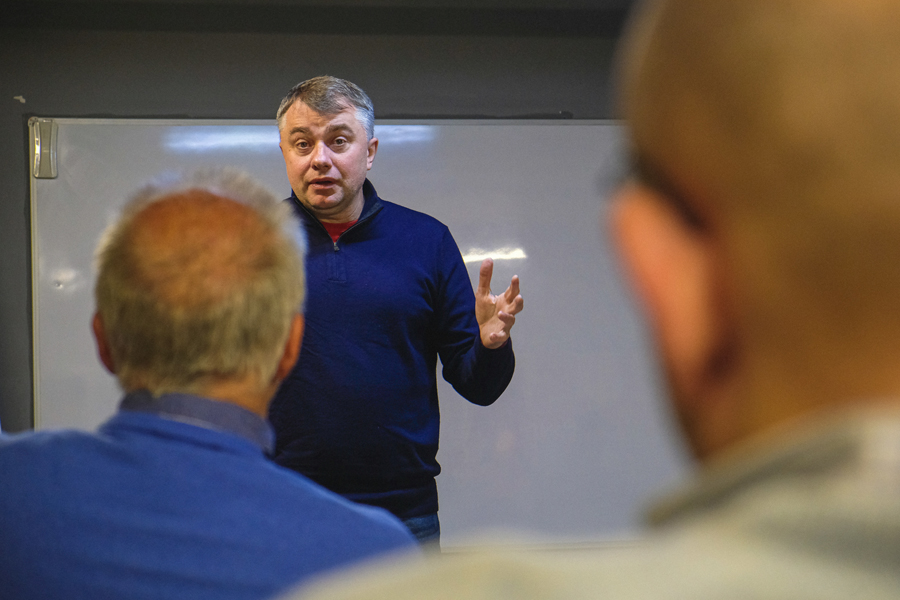
Ruslan Deynychenko. Photo: StopFake Facebook page.
Ruslan says that the organisation fights disinformation campaigns in several ways – particularly, by using fact-checking and promoting media literacy:
— When we spot suspicious messages, we check them. If we can find enough proof that it is a lie, we publish an article explaining to our readers what is false and why. Also, we teach ordinary citizens, journalists, dyplomatіs, and intelligencers how to spot disinformation. We conduct different training sessions, awareness campaigns, and research. We want to prevent lies and propaganda from ruining people’s lives.
There are several tools available to avoid falling for Russian propaganda:
– follow only verified and official sources;
– analyse information, seek out the original source, and think critically;
– avoid consuming Russian content altogether;
– fact-check suspicious claims.
Publications by StopFake help immediately identify the lies spread by hostile propaganda and the tactics it relies on.
StopFake is one of the organisations capable of tracking how events in the information space have unfolded over the years — including shifts in propaganda narratives and changes in tone.
— In 2013–2014, Russian propaganda sought to stir up internal conflict among Ukrainians and justify its initial invasion. We saw similar efforts throughout 2021 and early 2022. At first, the goal was to justify the full-scale invasion with claims about mythical biolabs (a false narrative by Russian propaganda, claiming the U.S. was funding secret bioweapons labs in Ukraine – ed.). But when that narrative lost credibility — and it became clear that few Russians would be willing to join the army and die over such absurdities — the tone shifted. Today, we see far more aggressive messaging: calls to bomb more, destroy infrastructure, target power plants etc.
According to Ruslan, if Russian TV channels hadn’t been banned in Ukraine in 2014, and Russian social media platforms in 2017, the situation in the country would be far worse today:
— As Crimea and Donechchyna proved, people who listened to Russian news had a distorted view of what Russia brings and what it actually is. Many genuinely believed that Ukrainians wanted to kill them, wipe them out, or ban them from speaking Russian — and that Russia was coming to “liberate” and help them. Some of those people eventually realised the truth, but sadly, it was already too late. That’s why we’re working to explain who is trying to deceive them and why — so fewer people fall into that trap on our territory.
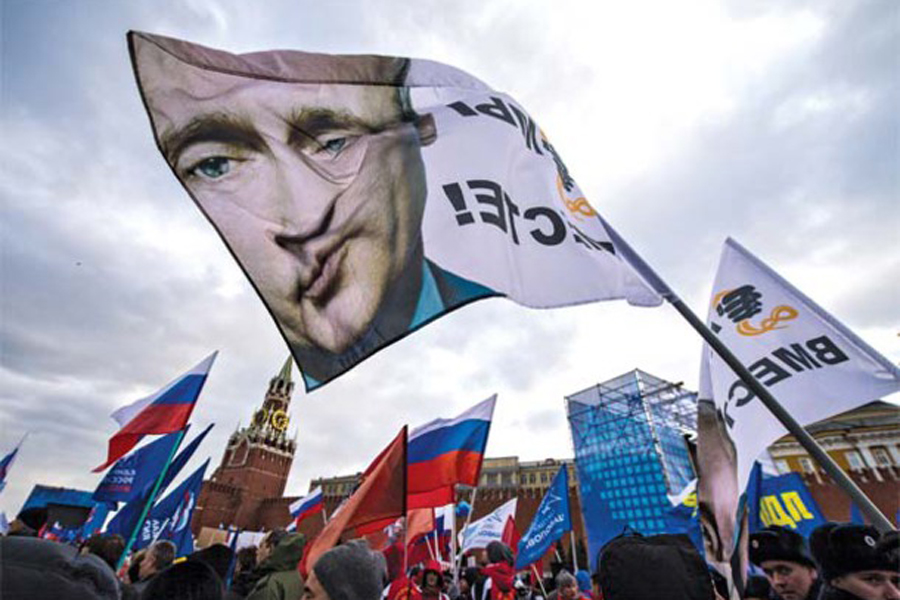
Photo: Detector Media.
The full-scale invasion not only brought more work but also forced the team to adapt its internal processes. Some members had to relocate — either abroad or to safer regions within Ukraine. During the first power outages caused by Russia’s attacks on critical infrastructure, the organisation had to learn how to operate without electricity, internet, and other basic resources. In addition, three members of StopFake volunteered to serve in various military and territorial defense units. Some have since returned from the front and continue their work.
Ruslan shares his experience and highlights the importance of fact-checking, which helped undermine the credibility of Russian media as a trusted source of information.
The organisation’s team also succeeded in convincing foreign political actors that Russian media are not about informing the public — but about distorting reality and spreading disinformation.
— In 2014, many of them (foreign politicians – ed.) said that it was undemocratic to ban Russian TV channels and that people should assess for themselves who was right and wrong. But again, this body of evidence that we have collected has convinced many that Russian television and social media are tools of influence.
Ukrainian analytical center “Detector media”
Detector media, on the one hand, is one of the most significant Ukrainian media focusing on media. The organisation’s mission is to promote the development of a mature society — one that is aware of its challenges and capable of overcoming them through constructive dialogue — by strengthening the influence of democratic, independent, and professional media on public processes in Ukraine and sharing this experience with other democratic societies around the world.

Джерело зображення: фейсбук-сторінка «Детектор медіа».
Halyna Petrenko, director of the NGO “Detector Media,” highlights several key areas of activity:
– improving the quality of media content across Ukraine;
– promoting media literacy to Ukrainians;
– countering desinformation.
The organisation had anticipated a potential full-scale Russian invasion of Ukraine and was therefore prepared for such a development. Halyna says:
— Since late 2021, we had forecasts suggesting that a full-scale invasion could happen, so we began planning how we would respond. Even then, we asked ourselves whether we could sustain all of our activities, whether they would remain relevant, and whether we needed to add anything new. The answer was that everything we were doing remained relevant.
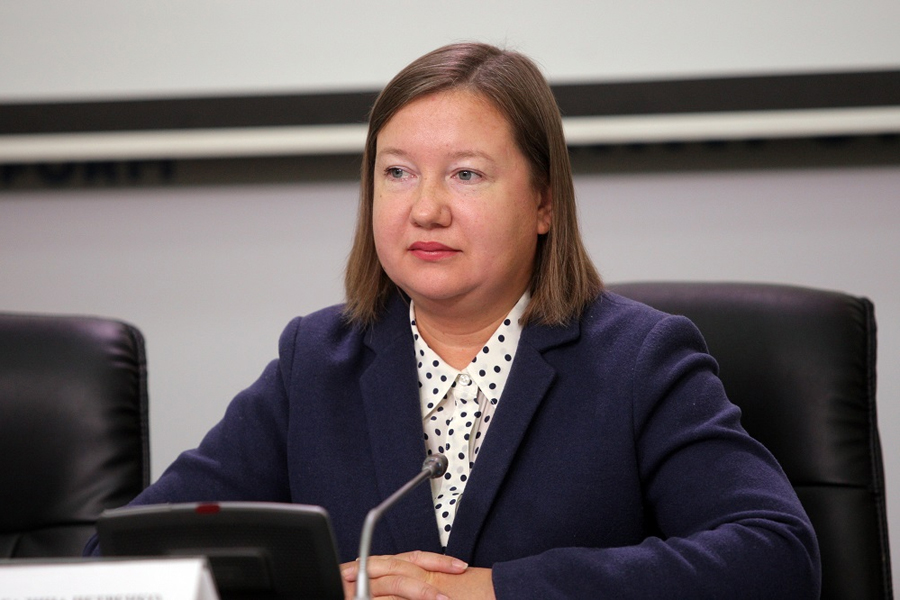
Halyna Petrenko. Photo: Detector Media.
On 24 February, 2022 (the day Russia launched the full-scale invasion – ed.), staff were given the opportunity to address their own safety needs — some relocated to safer regions of Ukraine, while others left the country.
— We have opened a representative office in Vilnius (the capital of Lithuania – ed.). Three people stayed there. And after that, everybody gradually returned to Kyiv. The second wave hit when the problem with electricity began. If someone had a house where they could place a generator in other regions, we would let people go.
In addition, a new challenge emerged after 24 February: some members of the organisation were mobilised to defend the country — and, tragically, some have lost their lives.
With the start of the full-scale war, the organisation began closely monitoring the information space — particularly disinformation on social media, where not everything can be done manually as specialists have to work with large volumes of data.
— We have to use plenty of IT instruments, artificial intelligence, and machine learning. We cannot, in practice, choose from every IT possibility in the world. We cannot go to San Francisco and choose for ourselves because, due to martial law, foreign payments are limited. And it really limits our field from implementing the newest findings. We’ve had to either develop in-house solutions (within the team – ed,), often duplicating efforts, or rely on a limited set of external options.
Halyna notes that when it comes to information warfare, Russia is both inventive and experienced. They operate simultaneously and at scale across multiple fronts.
— Sometimes, they [Russians] test something, not knowing whether it will work or not. For example, Russia decided to use Telegram long before the full-scale invasion. They created networks of disinformation telegram channels, but they didn’t expect Telegram to become the top news source in Ukraine during the invasion. We have noticed that before the full-scale invasion, just a week before it started, there were hundreds of new anonymous telegram channels dedicated to cities and villages that Russia either occupied or tried to occupy. There, they shared content to spread pro-Russian narratives among residents.

Photo: Julio Cortez for AP.
The team continues to produce investigative content and develop its own projects aimed at countering the enemy. One successful example is a project focused on exposing and tracking individuals who acted in the interests of the Russian Federation. Experts compiled detailed profiles backed by strong evidence. In 2023, this initiative evolved into a special project on media collaborators — those who have cooperated and continue to cooperate with the self-proclaimed authorities in the occupied territories.
Ultimately, this information drew the attention of law enforcement and intelligence agencies, and it now serves as part of the evidentiary base for crimes against Ukraine’s national security.
OSINT-team Molfar
The history of Molfar began in 2019, when its specialists started providing custom research services, focusing on information search and analysis.
With the beginning of the full-scale invasion of Russia in Ukraine in 2022, the company created the OSINT-community. Now, part of the Molfar team deals exclusively with war research, debunking propaganda, identifying Russian war criminals, and geospatial surveillance.
Open-source intelligence (OSINT)
is collecting and using data gathered from military, political, and other information from open sources without breaking the law.
Image: Molfar Facebook page.

Daria Verbytska, head of the PR department at the OSINT agency Molfar. Photo provided by Daria Verbytska for imi.org.ua
Daria Verbytska, Head of PR at Molfar, says that everything in the company revolves around evidence. It is evidence that they use to counter Russian disinformation and to disseminate truthful information about Ukraine.
Among the company’s main areas of work are the following:
– Business direction which includes business analytics, business intelligence, and everything related to the search for information for commercial orders;
– Military investigations, conducted on a pro bono basis. The findings are shared both in Ukraine and internationally.
– Media literacy training, offered free of charge to government institutions, volunteers, and journalists. Commercial training is also available upon request from private organisations.
– Community building — the company fosters a community of OSINT specialists by organising quests, challenges, tournaments, and more.
Like other organisations, Molfar fights in the information war not only against Russia, but also against organisations and opinion leaders who promote pro-Russian or terrorist narratives.
— I want to give an example of Human Rights Watch. This American organisation keeps on publishing shameful reports and pro-Russian statements. Those allegations have an enormous influence on the international community, and we have to address them.
Daria explains that while working under the conditions of full-scale war, the Molfar team encountered a number of challenges — among them, organisational difficulties:
— We had the main office in Dnipro (a city in southeastern Ukrine – ed.) and decided to stay there. We had problems because of electricity outages. We couldn’t work in a coworking space with others because we were investigating Russia. We cannot give away our location. We tried preventable stock of machines to find solutions. One of the biggest challenges was assembling a team in Kyiv from scratch in a year and a half. Now (in 2023 – ed.), we have more than 10 members, and we consistently work in an office and have power.
Despite all challenges, the organisation keeps fighting with information disseminated by Russia. One of the most popular methods of conducting the informational war is psychological operations and fakes about shellings and killings. In response, Molfar conducts fact-checking, studies the situation, and refutes the lies.
— We did this several times — with the drama theater in Mariupol, with the maternity hospital in Mariupol (debunking lies that claimed Ukrainians were shelling themselves – ed.). We also countered disinformation about the “voluntary” removal of Ukrainian children.
Information and Psychological Operations (IPSO) —
the deliberate dissemination of specific information to a foreign audience in order to influence its critical thinking, emotions, motivations, and actions.Among the team’s key investigations are a report on Russian Commissioner for Children’s Rights Maria Lvova-Belova (accused of orchestrating the deportation of Ukrainian children – ed.), and an in-depth piece on Russian private military companies (PMCs) involved in conflicts across multiple countries — not just the war in Ukraine.
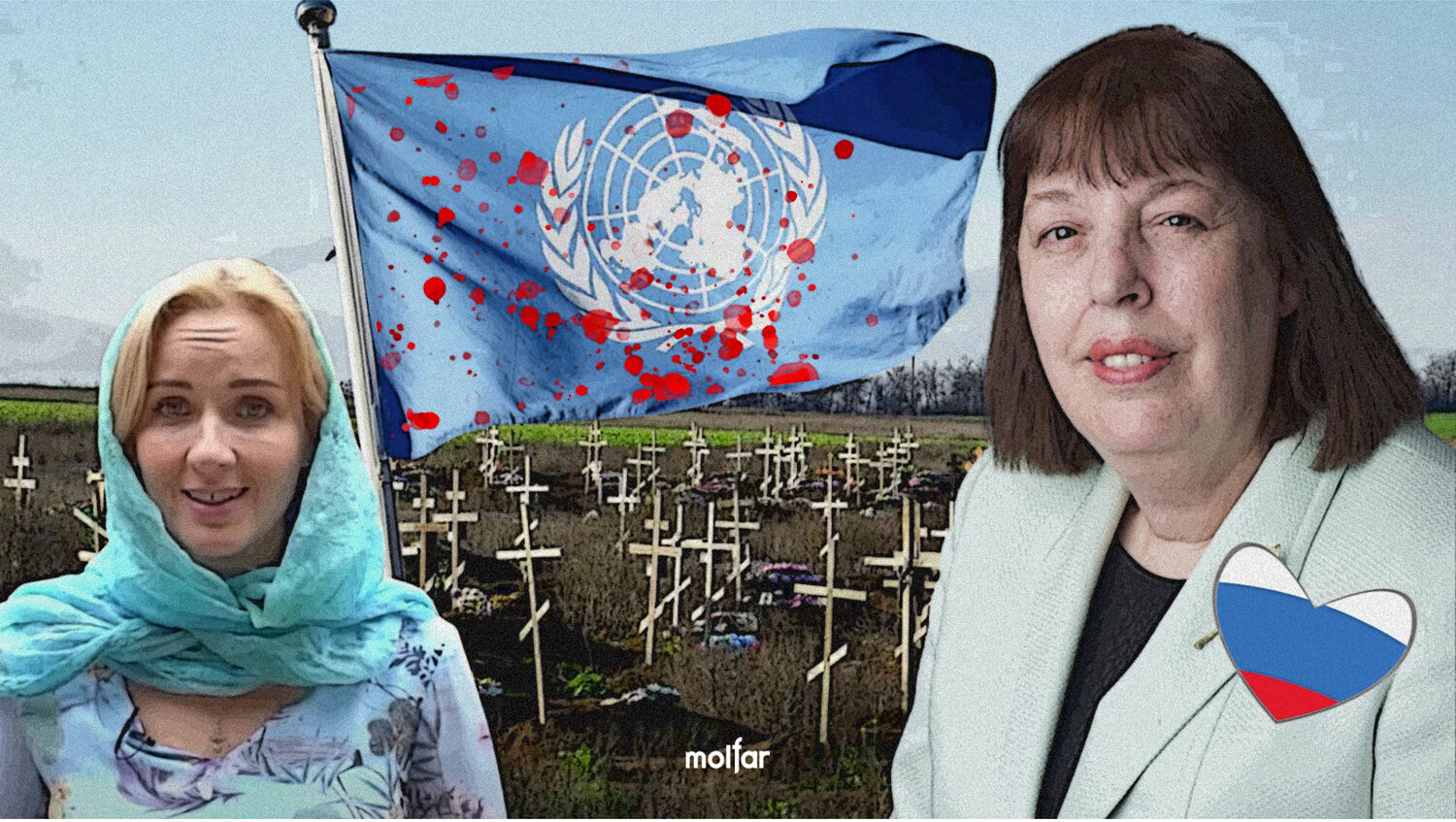
Image: Molfar Facebook page.
The team also gathered intelligence on Russian pilots based at the Engels-2 airbase (a strategic site used for long-range bomber strikes against Ukraine – ed.). Other investigations include a report on how China has been supplying drones to Russia by circumventing international sanctions, as well as an analysis of the destruction of the Kakhovka Hydroelectric Power Plant (blown up in June 2023 – ed.), widely viewed as a deliberate act by Russian forces that caused massive flooding and ecological damage in the south of Ukraine.
Additionally, the organisation has compiled registries of individuals labeled as enemies or traitors of Ukraine — including collaborators and war criminals. These databases have been frequently cited by international media and are used as reference points by intelligence services.
Non-profit organisation “PR Army”
The PR Army initiative was formed on 24 February 2022 — just hours after the start of Russia’s full-scale invasion. Ukrainian communications professionals came together to collectively resist Russia’s aggression. Anastasiia Marushevska, co-founder of the organisation and editor-in-chief of Ukraїner International, shares that they managed to unite around 700 media specialists and, within six months, establish an effective operational system.
– We define our mission as helping to defeat Russia and its allies in this war. An important point here is that we’re not focused solely on Russia, but on the entire global security system and how everything is interconnected.

Image: PR Army Facebook page.
The team consistently brings pressing topics related to the Russian-Ukrainian war into international media, offering fresh angles and connecting journalists with experts — all to ensure Ukraine remains in the global spotlight.
— Back in Soviet times — if not earlier — Russia realised it couldn’t defeat the West militarily. Instead, it has spent years using disinformation, bribing media outlets, and creating its own. In addition, Russia supports terrorist organisations.

Photo: Anastasiia Marushevska’s Facebook page.
Anastasiia highlights the following as PR Army’s core functions:
– Consistent international media presence. The organisation focuses specifically on foreign media and does not operate significantly within Ukraine.
– Reinforcing the voices of freedom. PR Army maintains a large database of Ukrainian experts, whom they actively pitch to international media. The goal is to ensure that Ukrainian voices are the ones telling Ukraine’s story and shaping the narrative.
– Disarming Russia. A key example is the issue of Western technologies still ending up in Russia and being used to produce weapons and missiles that kill Ukrainians. PR Army brings attention to this topic and works to amplify it in international media with a sense of urgency.
– Advocating critical topics. The organisation currently advocates for issues such as the detention of civilian hostages and the forced deportation of Ukrainians to Russia — aiming to prove that these are part of a deliberate Russian policy, not just accidental outcomes of war. This effort has developed into the project Where Are Our People?
PR Army also works across several additional focus areas, including the environmental and food crises, as well as the situation at the Chornobyl Nuclear Power Plant during its occupation. The team actively raised awareness about the Zaporizhzhia Nuclear Power Plant (Europe’s largest NPP, illegally occupied by Russia early in the full-scale invasion – ed.) and the inaction of the International Atomic Energy Agency (IAEA), which failed to hold Russia accountable or fulfill its mandate.The organisation also addresses issues related to culture and LGBTQ+ rights, both to reinforce Ukraine’s image as a democratic state and to expose Russia’s crimes against identity and human rights.
Anastasiia notes that PR Army has consciously chosen not to focus on fact-checking as its primary tool in the information war.
— It (fact-checking – ed.) is also important but it’s not enough to defeat the narrative. To counter it, you need to create counter-narratives.
One of the challenges PR Army faces is not only promoting the truth, but also breaking through the wall of misunderstanding surrounding the Ukrainian context.
— Media compete for attention — they’re constantly looking for dramatic stories. For example, we’ve worked extensively on the issue of deportations of Ukrainians. However, it’s hard to keep the spotlight on this topic, because outlets often want tragic stories of deported children. And yet, we can’t retraumatise these children or allow the media to use their pain as a way to reach a wider audience.

Photo: Paul Zinken for AP.
Every day, PR Army specialists push back against pro-Russian narratives and disinformation. Anastasiia notes that certain foundations and organizations work in Russia’s interest. For example, the “Russkiy Mir” Foundation provides funding to scholars in various Western countries to promote Russian narratives. One striking example of how Russian propaganda operates, she says, was its exploitation of the Hamas attack on Israel in October 2023.
— The Russians handed them captured Ukrainian weapons and began claiming that Ukraine was supplying arms to terrorists.
The “Russkiy Mir” Foundation
is a Russian state-funded organisation established in 2007 by Vladimir Putin to promote the Russian language, culture, and ideology abroad. In practice, the foundation is widely viewed as a soft-power tool, advancing pro-Russian narratives globally.
A damaged Merkava Mk 4 tank on the border with the Gaza Strip. Photo: Palestinian media.
Another example is Ukraine’s effort to root out the Moscow Patriarchate, which operates as an agent of hostile influence. In response, Russia amplified the issue in the U.S., framing it as an attack on religion — falsely claiming that Ukrainians were trying to destroy faith itself. One reason for this narrative push is that a significant portion of Orthodox churches worldwide belong to the Moscow Patriarchate. As a result, many Orthodox churches in the U.S. are aligned with it and often serve as centers of Russian propaganda.
– They tell their congregants these fairytales — that Ukrainians are destroying or persecuting religion. Of course, we pushed back. We created a range of materials about the Ukrainian Orthodox Church, as well as Ukrainian Protestants and Baptists. We did interviews with military chaplains and religious leaders from different denominations.
PR Army doesn’t focus on a single issue — its specialists advocate across a wide range of topics. For example, during a trip to the United States that PR Army co-organised, stories of deported Ukrainian children were shared at the United Nations and aired on major U.S. networks such as CBS and CBC, with the involvement of American actor Liev Schreiber. Reports on the militarisation of children were published in seven languages by Euronews and also appeared in The Guardian. The team contributed to investigations on deportations by The New York Times, Franco-German broadcaster ARTE, Swedish outlet SVT, and began working as early as 2022 with French and Belgian journalists through press briefings and articles in Le Monde and Le Libre.
The issue of civilian hostages was raised in Lithuanian, British, and French media. PR Army also brought attention to the need for stronger sanctions and the dismantling of Russia’s military-industrial complex in outlets such as Germany’s RND and Italy’s Corriere.
To date, the organisation has helped generate around 6,500 media stories across more than 70 countries, covering topics such as Russian shelling, war crimes, landmines, and the boycotts of Russian athletes and cultural figures. Beyond media work, the team organises advocacy events both in Ukraine and abroad, and also investigates the historical continuity of Russian crimes — for instance, presenting research on Russian manipulation of historical narratives at NATO.
— I see despair among Ukrainians — the feeling that the world doesn’t care about what’s happening here. But I wouldn’t say that’s true, especially among those in decision-making circles. In my view, the full-scale invasion has forced many countries to rethink their approaches. A good example is Germany, which used to be one of Russia’s main partners. Yet within the first year of the invasion, Germany likely gave up all Russian energy resources. The same goes for France — we’ve seen a shift in President Macron’s stance.
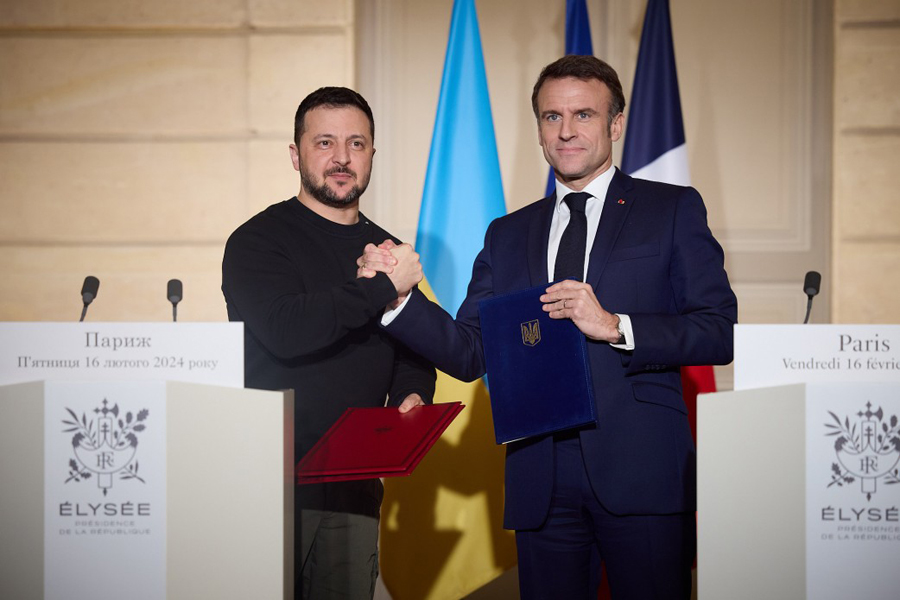
Emmanuel Macron and Volodymyr Zelenskyy. Photo: president.gov.ua.
Anastasiia explains that no aid to Ukraine and no sanctions ever appear out of nowhere — behind each one is the systematic work of many people. In every organisation, there are individuals advocating for Ukraine’s interests at the international level.
— For me, and for our organisation as a whole, one of the main motivations is to do everything possible to prevent more Ukrainians from dying on the front line. The world doesn’t function without diplomacy and information — almost nothing happens without them. So it’s naive to pretend these things don’t matter. In my view, one of the reasons this war is happening at all is because Ukraine, at some point, lost the information war. There are understandable reasons and historical context behind that — but we simply can’t afford to lose it again.
The LetsData analytics team
LetsData is a Ukrainian startup launched after the full-scale invasion. Its work differs from that of the previously mentioned organisations — here, the focus is on using technology to detect disinformation, while others are responsible for countering it.

Image: Lets Data Facebook page.

Ksenia Iliuk. Photo: Ksenia Iliuk's Linkedin page.
Co-founder Kseniia Iliuk says the core value of LetsData is to be a driver of social impact and change. The company also follows a strict policy of not working with political parties. Instead, its specialists take on projects for state institutions in democratic countries or for honest and transparent private organisations.
— Before the full-scale invasion, my co-founder Andriy Kusyy and I were exploring different projects in the field of media analytics — experimenting, testing things out, mostly out of personal interest and for our own development. But after 24 February [2022], we realised there was a real demand for an advanced technological tool that could analyse the entire information space in real time and detect disinformation within it.
Kseniia explains that their company functions like a disinformation radar, operating across three key areas: detection, understanding, and forecasting. The team uses artificial intelligence to continuously scan the information space in real time and identify early signals of disinformation campaigns. Their role is to detect these signals and support those who are actively countering false narratives.
— The earlier we identify these signals, the more time and opportunity we give others to act proactively. Once a disinformation campaign is already in motion, a completely different set of tools is needed. Our goal is to enable clients to stay ahead of the curve. As soon as they take action, we begin measuring the effectiveness of their response.
One of LetsData’s key features is its alert system — notifications sent to email or phone to enable rapid response. Kseniia explains:
— Companies respond to our alerts and begin taking action. But sometimes we send alerts to flag the emergence of a certain message — not to react to it, but simply to monitor it. In those cases, the message shows no real potential to spread. The problem is that disinformation is sometimes countered without understanding who it targets or whether it will actually grow — and with good intentions, people can end up amplifying it by pulling it into the broader information space.
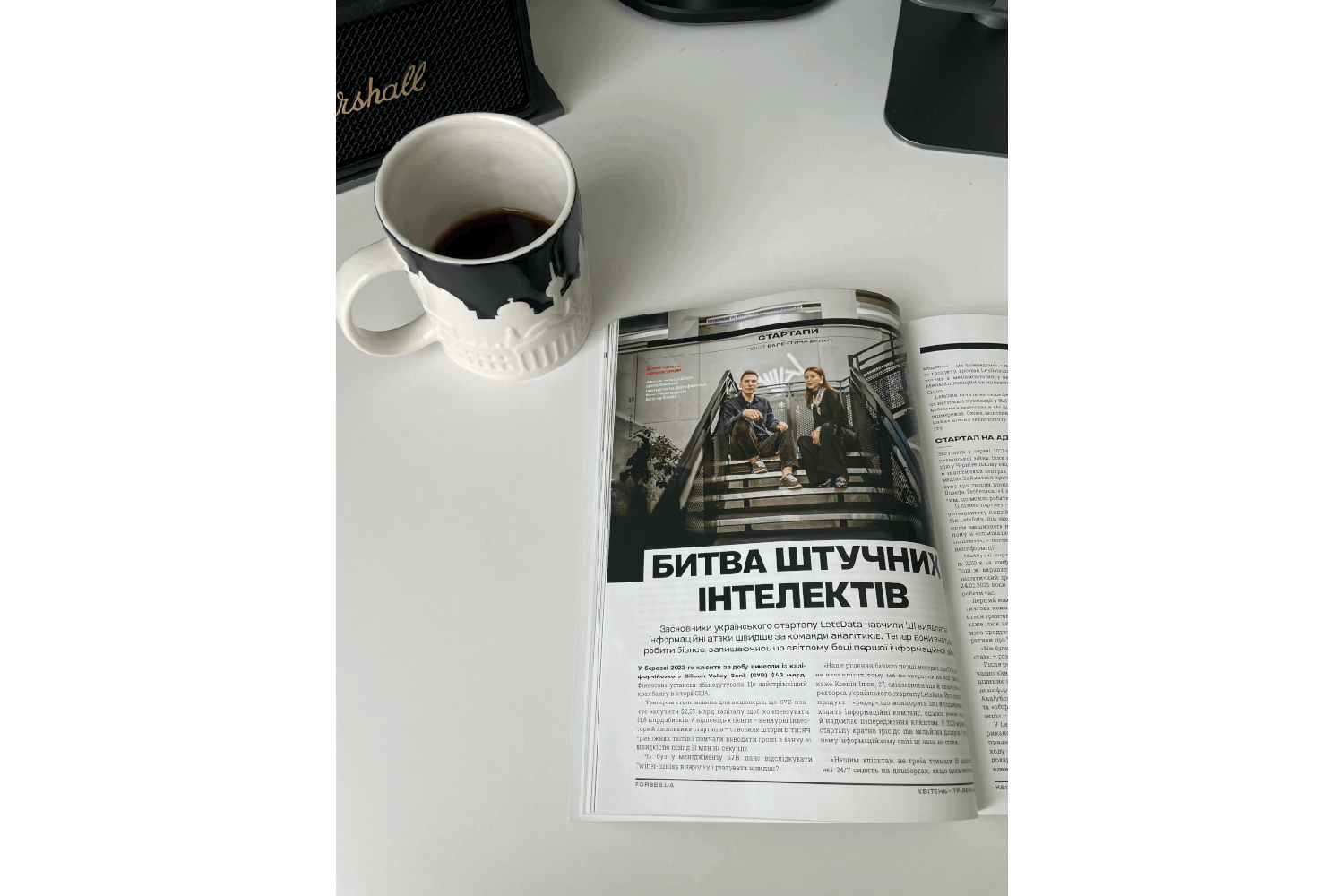
Photo: Lets Data’s Linkedin page.
Like most organisations, LetsData faces challenges — particularly technical ones, such as access to data.
— We analyse data from all types of media and social networks. But some platforms go out of their way to make data access extremely difficult. Since we follow ethical practices, we collect only permitted information — which is, unfortunately, often limited in volume. Meanwhile, hostile actors disregard these restrictions entirely. That’s something we refuse to do.
The LetsData team analysed the discourse of local Telegram channels in areas occupied after 24 October, 2022, as well as in frontline communities. Kseniia shares:
— We released a study featuring practical case studies and recommendations on how to counter propaganda and disinformation. Based on these insights, various messages were communicated to local authorities. They’ve been developing different policies and approaches, implementing certain measures — and the results so far have been quite positive.

The moment of homecoming for Ukrainian children deported by Russia. Photo: Radio Liberty.
Among the international projects is an example of sharing accurate information about the forced deportation of children.
— We worked together with Ukraine’s Ministry of Foreign Affairs and a coalition of organisations. At one point, we provided an insight showing that the issue of the illegal deportation of Ukrainian children had the lowest penetration of Russian narratives among foreign audiences. This created an opportunity not to directly counter disinformation, but rather to proactively share truthful information — to show that the worldview Russia was promoting simply wasn’t real. PR Army focused on this topic, and it became one of the rare cases where Russian narratives were completely eliminated from European media. I see that as a major victory, especially given that it contributed to the issuance of an arrest warrant (in March 2023, the International Criminal Court issed the warrant – ed.) for Putin in connection with the illegal deportation of Ukrainian children.

